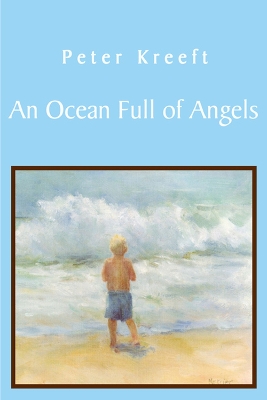[In the author's words:] I have written almost sixty books, but this one is very different from all the others. For one thing, it took 20 years. I had to wait patiently for it to grow, like a tree. I was not in control of it; it kept changing, as I watched at it and let it do what it did, like an animal out of its cage.
It began as a much more philosophical, talky, rational, in-control kind of book. The plot and the characters were originally there for the sake of the words, the points, the philosophy. Then the story and the character happily took over, and turned it into the opposite kind of book, in which the words were there for the sake of the characters and the events of the story, even though it remained long and wordy, and philosophical.
Then I cannibalized the long and wordy original book by extracting the philosophi-cal passages and making no less than five other little books out of them: 1. The Sea Within explores the puzzle of humanity's mysterious love affair with the sea; 2. I Surf, Therefore I Am, is a mystical philosophy of surfing; 3. If Einstein Had Been a Surfer is about what kinds of thinking have to be included in a Theory of Everything; 4. A Refutation of Moral Relativism; and 5. Islamic Dialogs. Some of these utilize characters that are in Ocean. But these are all books of philosophy that cluttered up the story, so I had to evict them from its premises. These five other books all fascinate me, and I hope they will fascinate readers, but not in the same way as Ocean does.
Ocean is about connections: In the sense it is my "Theory of Everything"; it shows in a story the surprising, invisible, yet powerful connections among things. Philosophy, science, and theology can state, define, and argue for those connections, but story is more convincing because it presents them, shows them. That's why story is more powerful than philosophy in convincing us. (How many Romans were converted by Christian theology? How many by the Gospel story?) No philosopher was able to convince me that "we are each responsible for all." But Dostoevsky did: he showed it in The Brothers Karamazov.
[In the publisher's words:] This is the damnedest novel you'll ever read. It's more an autobiography or a rumination on the state of man's soul from an exciting and fascinating writer. I can only compare it to reading The Brothers Karamazon the second time, after you realize that the whole center section on the teachings of Fr. Zosima is the central core of the novel or, if you have a larger capacity for crap than I have, reading Ayn Rand's Atlas Shrugged without becoming a cult member. It is belles lettres, metaphysics and physics combined, psychology, theology, and spirituality as related by a beguiling story-teller. It is like reading the last few pages of Hegel, without the suffering that it took to get there, or finally seeing the whole grand structure of Thomas Aquinas, when the theory of everything and the synthesis that ties all of life together become visible through the maze.
- ISBN10 1587315904
- ISBN13 9781587315909
- Publish Date 15 April 2011
- Publish Status Active
- Publish Country US
- Imprint St Augustine's Press
- Format Hardcover
- Pages 374
- Language English
